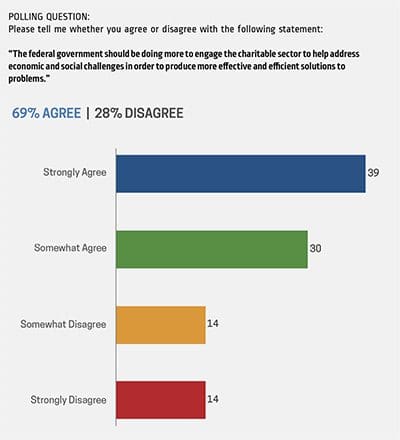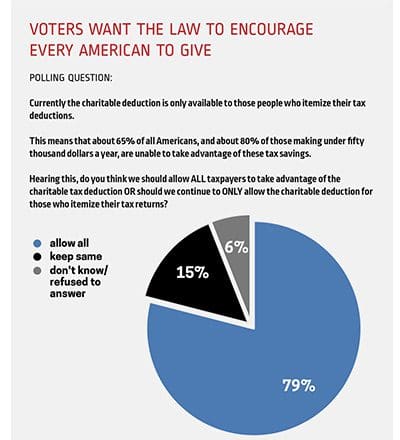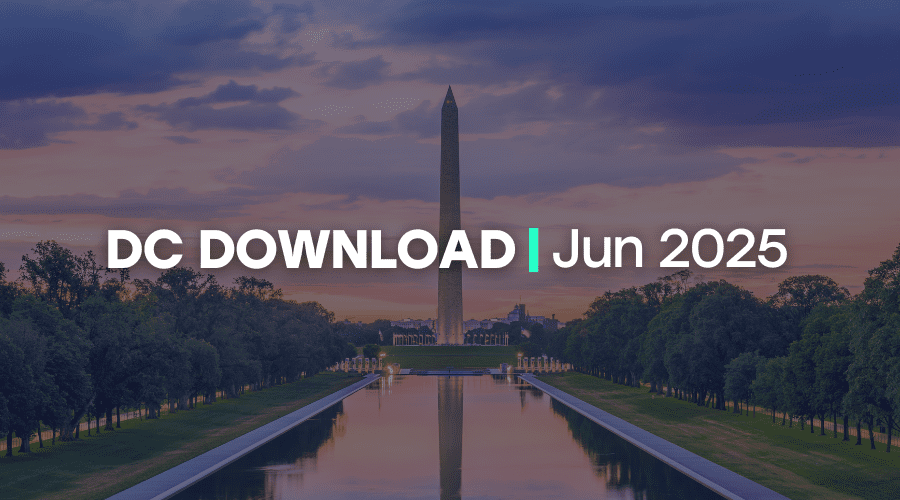By Candy Hill and Geoffrey Plague
Alexis de Tocqueville, an early visitor to our shores, observed that “In every case, at the head of any new undertaking, where in France you would find the government or in England some territorial magnate, in the United States, you are sure to find an association”—citizens working together to build a new world.
 Today, the charitable sector is not only deeply ingrained in our society but enjoys overwhelming, bipartisan support from the American public. A reservoir of neighborly respect is replenished daily in hometowns and local communities. Having seen our commitment in action, voters trust us to be more active partners with government to address challenges, solve problems, and – over time – create a more perfect union.
Today, the charitable sector is not only deeply ingrained in our society but enjoys overwhelming, bipartisan support from the American public. A reservoir of neighborly respect is replenished daily in hometowns and local communities. Having seen our commitment in action, voters trust us to be more active partners with government to address challenges, solve problems, and – over time – create a more perfect union.
This portrait is not conjecture; it is based on public polling conducted by Independent Sector, in preparation for our direct engagement with the campaigns of Donald Trump and Hillary Clinton on behalf of the charitable community.
We partnered with a team of respected, bipartisan pollsters to conduct two voter focus groups, one in person and one online, as well as a national phone survey of 1,300 voters, 500 in presidential battleground states and 800 from across the country. The data we collected shows that while the American public – like their elected officials – don’t generally know very much about the sector, they do have positive feelings about charitable organizations, and can be quickly educated to a place of very strong support for policies that enhance our ability to do our work.
 Among the highlights:
Among the highlights:
- Voters believe by nearly a three-to-one margin that the charitable sector has too little, rather than too much, power and influence with leaders in Washington
- More than three quarters of voters believe government should engage more with the charitable sector to address economic and social challenges
- When told of the connection between charitable giving and the delivery of services in their community, 82 percent of voters express support for increasing the charitable deduction and encouraging more giving
- 70 percent of voters would support a candidate for president who supports polices that allow greater participation by the charitable sector in the policy making process
- 85 percent believe nonprofits should operate under the same rules as others regarding their communication with policymakers, and
- 79 percent believe every taxpayer should be allowed to deduct his or her charitable contributions, not just those who itemize their tax returns.
We also tested eleven arguments in favor of the charitable community taking a more active role in government policy making. The following messages were among the seven found to be persuasive by at least 80 percent of voters:
- Charitable organizations provide a voice for many members of society who would not otherwise have one
- The charitable sector is one of the few institutions with the ability to bridge growing economic, racial, and political divides in our country
- Large societal problems like hunger and illiteracy cannot be solved by simply providing meals or distributing books – changes to the law are also required, and
- Charitable organizations work in communities every day to solve a wide range of problems, giving them an expertise that should be tapped by policymakers.
 Building on what we learned, we worked throughout the summer to leverage that political support to engage both the Republican and Democratic candidates for the White House. This has included meetings with senior staff from both campaigns in their offices in Manhattan and Brooklyn, educating them about the social and economic impact of our sector, sharing with them the deep support we enjoy from voters around the country and in key electoral states, and urging them to support policy changes that are consistent with the views of U.S. voters.
Building on what we learned, we worked throughout the summer to leverage that political support to engage both the Republican and Democratic candidates for the White House. This has included meetings with senior staff from both campaigns in their offices in Manhattan and Brooklyn, educating them about the social and economic impact of our sector, sharing with them the deep support we enjoy from voters around the country and in key electoral states, and urging them to support policy changes that are consistent with the views of U.S. voters.
Those with whom we met acknowledged our sector’s local impact and support. They understood the desire on the part of voters of every description for authentic leadership, the kind acquired by someone who has actually done the work on the ground. That is why the American public feels strongly that the charitable sector should have an equal place at the policymaking table as their for-profit peers, understand there are barriers that prevent
the organizations they trust from influencing policy changes, and want to see policymakers proactively inviting members of the charitable sector to the table and tapping our expertise to solve problems.
 To that end, we have worked to educate the presidential campaigns about the lack of clarity in the rules governing charitable sector engagement in public policy conversations, and are encouraging the candidates to work with us to clarify the rules of public policy engagement for the charitable sector and actively encourage their participation.
To that end, we have worked to educate the presidential campaigns about the lack of clarity in the rules governing charitable sector engagement in public policy conversations, and are encouraging the candidates to work with us to clarify the rules of public policy engagement for the charitable sector and actively encourage their participation.
Independent Sector’s approach to our public policy work is grounded in John Gardner’s vision of our community:
“The [independent] sector enhances our creativity, enlivens our communities, nurtures individual responsibility, stirs life at the grassroots, and reminds us that we were born free. Its vitality is rooted in good soil – civic pride, compassion, a philanthropic tradition, a strong problem-solving impulse, a sense of individual responsibility and, despite what cynics may say, an irrepressible commitment to the great shared task of improving our life together.”
That commitment to improving our life together continues to this day to inform our thinking and drives our engagement on public policy issues that impact – or have the potential to impact – the ability of all charitable and philanthropic organizations, irrespective of size, mission or location, to lift up lives and improve society. And it is what compelled us to take advantage of the opportunity presented by this year’s presidential election to lift up the collective voices of our community.
Note: This information was released to the public on September 22 and can be found at https://independen1stg.wpengine.com/resource/united-for-charity.

 Among the highlights:
Among the highlights:

